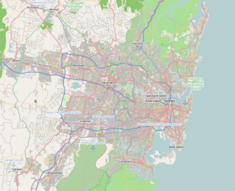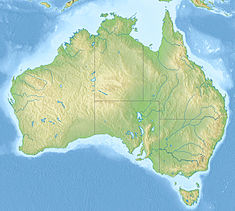
Darlinghurst is an inner-city suburb in the eastern suburbs of Sydney, New South Wales, Australia. Darlinghurst is located immediately east of the Sydney central business district (CBD) and Hyde Park, within the local government area of the City of Sydney. It is often colloquially referred to as "Darlo".

Richmond is a historic town northwest of Sydney, New South Wales, Australia. Richmond is in the local government area of the City of Hawkesbury and is part of the Sydney metropolitan area. It is located 19 metres above sea level on the alluvial Hawkesbury River flats, at the foot of the Blue Mountains. It is about 62 km by road from Sydney, 22 km from Penrith, 25 km from Blacktown, 39 km from Parramatta, 78 km from Lithgow and 7 km from Windsor. Richmond is now part of the Sydney urban area, with access to various amenities.
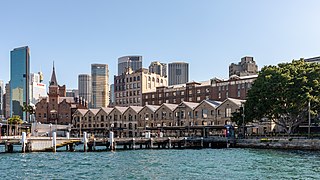
The Rocks is a suburb, tourist precinct and historic area of Sydney's city centre, in the state of New South Wales, Australia. It is located on the southern shore of Sydney Harbour, immediately north-west of the Sydney central business district.
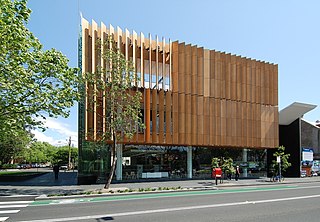
Surry Hills is an inner-east suburb of Sydney, in the state of New South Wales, Australia. Surry Hills is immediately south-east of the Sydney central business district in the local government area of the City of Sydney. Surry Hills is surrounded by the suburbs of Darlinghurst to the north, Chippendale and Haymarket to the west, Moore Park and Paddington to the east and Redfern to the south. It is often colloquially referred to as "Surry".

Potts Point is a small and densely populated suburb in inner-city Sydney, New South Wales, Australia. Potts Point is located 2 kilometres (1.2 mi) east of the Sydney central business district and is part of the local government area of the City of Sydney.
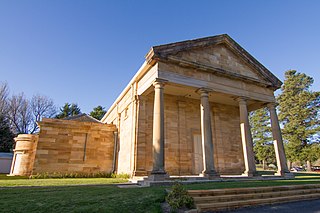
Berrima is a historic village in the Southern Highlands of New South Wales, Australia, in Wingecarribee Shire. The village, once a major town, is located on the Old Hume Highway between Sydney and Canberra. It was previously known officially as the Town of Berrima. It is close to the three major towns of the Southern Highlands: Mittagong, Bowral and Moss Vale.
John Verge (1782–1861) was an English architect, builder, pioneer settler in the Colony of New South Wales, who migrated to Australia and pursued his career there. Verge was one of the earliest and the most important architect of the Greek Revival in Australia. He also brought more comprehensive range of Regency style than any contemporary architects. His design indicates the increasing of sophistication compared to previous architect's design.

Millers Point is an inner-city suburb of Sydney, in the state of New South Wales, Australia. It is on the north-western edge of the Sydney central business district, adjacent to The Rocks and is part of the local government area of the City of Sydney.

Colonel Walter Liberty Vernon was an English architect who migrated to Australia and pursued his career as an architect in Sydney, New South Wales. In his role as the New South Wales Government Architect he is noted for designing multiple government buildings, many of which are extant with listings on national and state heritage registers.

Mortimer William Lewis was an English-born architect, surveyor and public servant who migrated to Australia and became Colonial Architect in the colony of New South Wales from 1835 to 1849. Lewis was responsible for designing and overseeing many government buildings in Sydney and rural New South Wales, many of which are heritage listed.

The St John's Anglican Church, officially known as the Church of St. John the Evangelist, is a heritage-listed active Anglican church located at 120 Darlinghurst Road in the Sydney suburb of Darlinghurst, New South Wales, Australia. The church and its associated buildings were added to the New South Wales State Heritage Register on 2 April 1999. It was also listed on the former Register of the National Estate.

The Darlinghurst Courthouse is a heritage-listed courthouse building located adjacent to Taylor Square on Oxford Street in the inner city Sydney suburb of Darlinghurst in the City of Sydney local government area of New South Wales, Australia. Constructed in the Old Colonial Grecian style based on original designs by Colonial Architect, Mortimer Lewis, the building structure was completed in 1880 under the supervision of Lewis's successor, James Barnet. It was added to the New South Wales State Heritage Register on 2 April 1999.
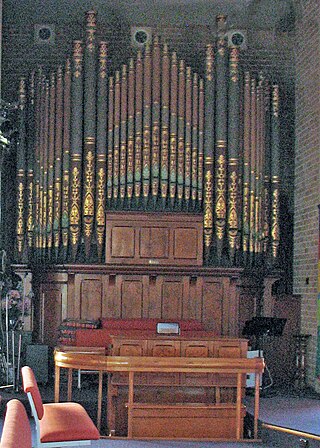
The Galston Uniting Church Pipe Organ or Pipe Organ from Bourke Street Congregational Church is a heritage-listed church pipe organ located at 11 School Road, Galston in the Hornsby Shire local government area of New South Wales, Australia. It was built by Forster and Andrews. It is also known as Pipe Organ from Bourke Street Congregational Church (former) and Forster and Andrews Pipe Organ; Galston Uniting Church Pipe Organ. The property is owned by Uniting Church in Australia. It was added to the New South Wales State Heritage Register on 2 April 1999.

St John's Roman Catholic Church and Cemetery is a heritage-listed former school and now Roman Catholic church building located in George Street in Campbelltown. It was designed by John Joseph Therry and built from 1824 to 1841. It is also known as St Johns Roman Catholic Church and Cemetery (former), Saint Johns Roman Catholic Church and Old St John's Church. It was added to the New South Wales State Heritage Register on 2 April 1999. The current church, called St John the Evangelist Catholic Church was built in 1886 and is located at Cordeaux Street, Campbelltown in the City of Campbelltown local government area of New South Wales, Australia. The property is owned by Trustees of the Roman Catholic Church for the Diocese of Wollongong.

St Peter's Church is a heritage-listed former Anglican church precinct on the corner of Bourke Street and St Peters Street, in the inner city Sydney suburb of Darlinghurst in the City of Sydney local government area of New South Wales, Australia. It was added to the New South Wales State Heritage Register on 2 April 1999 and is listed on the Australian Register of the National Estate.

Stoneleigh is a heritage-listed residence at 1 Darley Street in the inner city Sydney suburb of Darlinghurst in the City of Sydney local government area of New South Wales, Australia. It was built in 1860. It is also known as Greencourt. It was added to the New South Wales State Heritage Register on 2 April 1999.
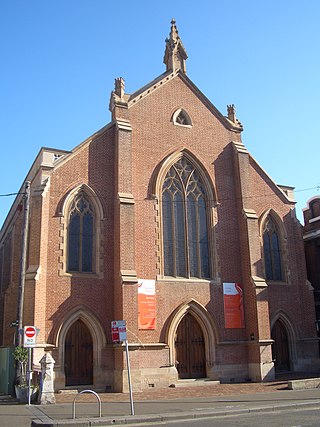
The Newtown Mission Uniting Church is a heritage-listed Uniting church at 280a King Street, Newtown, City of Sydney, New South Wales, Australia. It was designed by George Allen Mansfield and built in 1859 by Thomas Abbott. It was added to the New South Wales State Heritage Register on 2 April 1999.

St Sophia Greek Orthodox Church, officially the St Sophia and Her Three Daughters Greek Orthodox Church, is a heritage-listed Greek Orthodox church at 411a Bourke Street in the inner city Sydney suburb of Surry Hills in the City of Sydney local government area of New South Wales, Australia. Formerly a Congregational church, the building is also known as the former Bourke Street Congregational Church and School. It was added to the New South Wales State Heritage Register on 2 April 1999.

